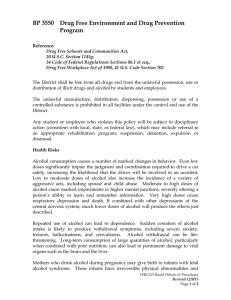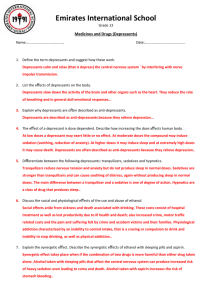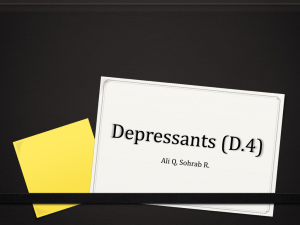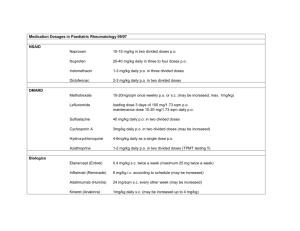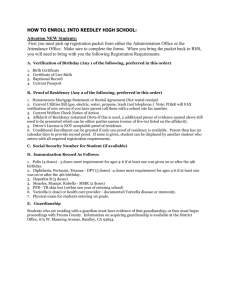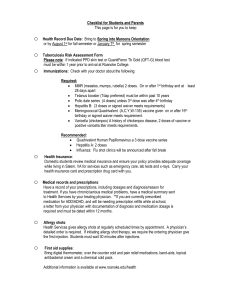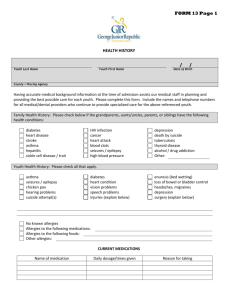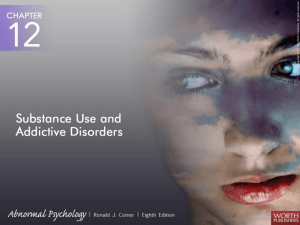Other Drugs DRUGS COMMON NAMES HEALTH RISKS OF DRUG
advertisement
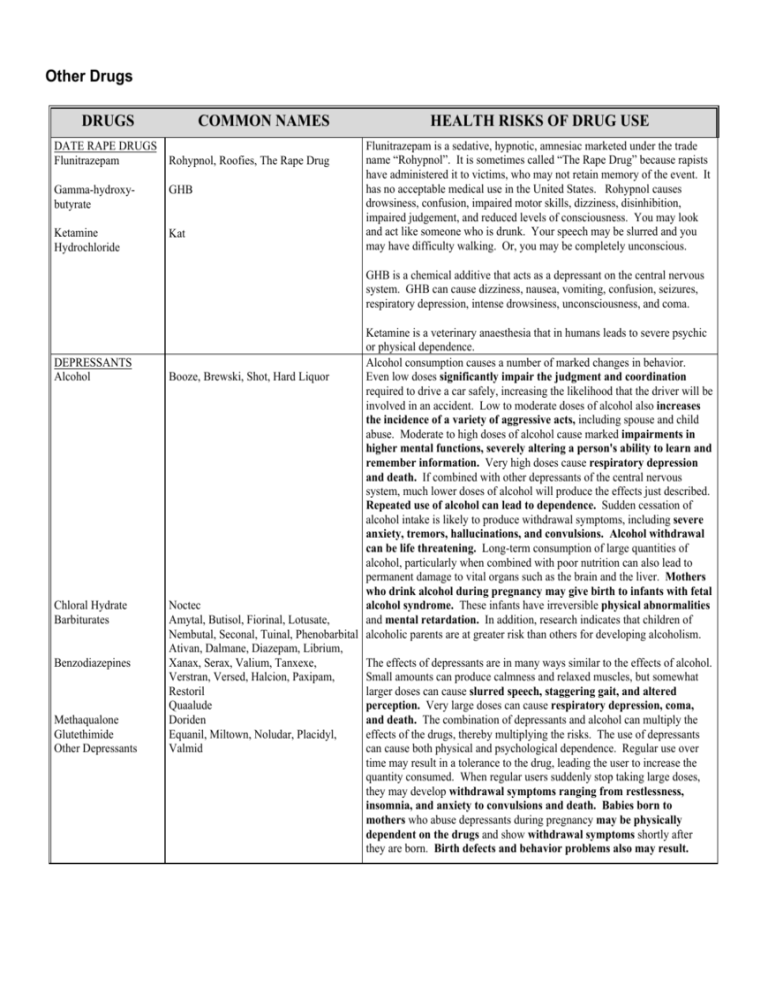
Other Drugs DRUGS DATE RAPE DRUGS Flunitrazepam COMMON NAMES Rohypnol, Roofies, The Rape Drug Gamma-hydroxybutyrate GHB Ketamine Hydrochloride Kat HEALTH RISKS OF DRUG USE Flunitrazepam is a sedative, hypnotic, amnesiac marketed under the trade name “Rohypnol”. It is sometimes called “The Rape Drug” because rapists have administered it to victims, who may not retain memory of the event. It has no acceptable medical use in the United States. Rohypnol causes drowsiness, confusion, impaired motor skills, dizziness, disinhibition, impaired judgement, and reduced levels of consciousness. You may look and act like someone who is drunk. Your speech may be slurred and you may have difficulty walking. Or, you may be completely unconscious. GHB is a chemical additive that acts as a depressant on the central nervous system. GHB can cause dizziness, nausea, vomiting, confusion, seizures, respiratory depression, intense drowsiness, unconsciousness, and coma. DEPRESSANTS Alcohol Chloral Hydrate Barbiturates Benzodiazepines Methaqualone Glutethimide Other Depressants Ketamine is a veterinary anaesthesia that in humans leads to severe psychic or physical dependence. Alcohol consumption causes a number of marked changes in behavior. Booze, Brewski, Shot, Hard Liquor Even low doses significantly impair the judgment and coordination required to drive a car safely, increasing the likelihood that the driver will be involved in an accident. Low to moderate doses of alcohol also increases the incidence of a variety of aggressive acts, including spouse and child abuse. Moderate to high doses of alcohol cause marked impairments in higher mental functions, severely altering a person's ability to learn and remember information. Very high doses cause respiratory depression and death. If combined with other depressants of the central nervous system, much lower doses of alcohol will produce the effects just described. Repeated use of alcohol can lead to dependence. Sudden cessation of alcohol intake is likely to produce withdrawal symptoms, including severe anxiety, tremors, hallucinations, and convulsions. Alcohol withdrawal can be life threatening. Long-term consumption of large quantities of alcohol, particularly when combined with poor nutrition can also lead to permanent damage to vital organs such as the brain and the liver. Mothers who drink alcohol during pregnancy may give birth to infants with fetal Noctec alcohol syndrome. These infants have irreversible physical abnormalities Amytal, Butisol, Fiorinal, Lotusate, and mental retardation. In addition, research indicates that children of Nembutal, Seconal, Tuinal, Phenobarbital alcoholic parents are at greater risk than others for developing alcoholism. Ativan, Dalmane, Diazepam, Librium, Xanax, Serax, Valium, Tanxexe, The effects of depressants are in many ways similar to the effects of alcohol. Verstran, Versed, Halcion, Paxipam, Small amounts can produce calmness and relaxed muscles, but somewhat Restoril larger doses can cause slurred speech, staggering gait, and altered Quaalude perception. Very large doses can cause respiratory depression, coma, Doriden and death. The combination of depressants and alcohol can multiply the Equanil, Miltown, Noludar, Placidyl, effects of the drugs, thereby multiplying the risks. The use of depressants can cause both physical and psychological dependence. Regular use over Valmid time may result in a tolerance to the drug, leading the user to increase the quantity consumed. When regular users suddenly stop taking large doses, they may develop withdrawal symptoms ranging from restlessness, insomnia, and anxiety to convulsions and death. Babies born to mothers who abuse depressants during pregnancy may be physically dependent on the drugs and show withdrawal symptoms shortly after they are born. Birth defects and behavior problems also may result. CANNABIS Marijuana Pot, Acapulco, Gold, Grass, Reefer, Sinsemilla, Thai Sticks Tetrahydrocannabinol THC, Marinil Hashish Hash Hashish Oil Hash Oil INHALANTS Nitrous Oxide Laughing Gas, Whippets Amyl Nitrite Butyl Nitrite Chlorohydrocarbons Hydrocarbons STIMULANTS Cocaine Immediate negative effects of inhalants include nausea, sneezing, coughing, nosebleeds, fatigue, lack of coordination, and loss of appetite. Solvents and aerosol sprays also decrease the heart and respiratory rates, Poppers, Snappers and impair judgment. Amyl and butyl nitrite cause rapid pulse, headaches, and involuntary passing of urine and feces. Long term use Rush, Bolt, Locker Room, Bullet, Climax may result in hepatitis or brain hemorrhage. Deeply inhaling the vapors, or using large amounts over a short period of time, may result in disorientation, violent behavior, unconsciousness, or death. High Aerosol Sprays concentrations of inhalants can cause suffocation by displacing the oxygen in the lungs or by depressing the central nervous system to the point that breathing stops. Long term use can cause weight loss, fatigue, electrolyte Solvents imbalance, and muscle fatigue. Repeated sniffing of concentrated vapors over time can permanently damage the nervous system. Coke, Snow, Flake, White, Blow, Nose Candy, Big C, Snowbirds, Lady Crack Crack, Freebase Rocks, Rock Methamphetamine Ice Amphetamines Biphetamine, Delcobese, Desoxyn, Dexedrine, Obetrol Phenmetrazine Preludin Methylphenidate Other Stimulants All forms of cannabis have negative physical and mental effects. Several regularly observed physical effects of cannabis are a substantial increase in the heart rate, bloodshot eyes, a dry mouth and throat, and increased appetite. Use of cannabis may impair or reduce short-term memory and comprehension, alter sense of time, and reduce ability to perform tasks requiring concentration and coordination, such as driving a car. Research also shows that students do not retain knowledge when they are "high." Motivation and cognition may be altered, making the acquisition of new information difficult. Marijuana can also produce paranoia and psychosis. Because users often inhale the unfiltered smoke deeply and then hold it in their lungs as long as possible, marijuana is damaging to the lungs and pulmonary system. Marijuana smoke contains more cancercausing agents than tobacco. Long-term users of cannabis may develop psychological dependence and require more of the drug to get the same effect. The drug can become the center of their lives. Cocaine stimulates the central nervous system. Its immediate effects include dilated pupils and elevated blood pressure, heart rate, respiratory rate, and body temperature. Occasional use can cause a stuffy or runny nose. While chronic use can ulcerate the mucous membrane of the nose. Injecting cocaine with unsterile equipment can transmit hepatitis and other diseases, as well as the HIV virus which can lead to AIDS. Preparation of freebase, which involves the use of volatile solvents, can result in death or injury from fire or explosion. Cocaine can produce psychological and physical dependency, a feeling that the user cannot function without the drug. In addition, tolerance develops rapidly. Crack or freebase rock is extremely addictive, and its effects are felt within 10 seconds. The physical effects include dilated pupils, increased pulse rate, elevated blood pressure, insomnia, loss of appetite, tactile hallucinations, paranoia, and seizures. The use of cocaine can cause death by disrupting the brain's control of the heart and respiration. Stimulants can cause increased heart and respiratory rates, elevated blood pressure, dilated pupils, and decreased appetite. In addition, users Ritalin may experience sweating, headache, blurred vision, dizziness, sleeplessness, and anxiety. Extremely high doses can cause a rapid or Adipex, Cylert, Didrex, Ionamin, Melfiat, irregular heartbeat, tremors, loss of coordination, and even physical Plegine collapse. An amphetamine injection creates a sudden increase in blood pressure that can result in stroke, very high fever, or heart failure. In addition to the physical effects, users report feeling restless, anxious, and moody. Higher doses intensify the effects. Persons who use large amounts of amphetamines over a long period of time can develop an amphetamine psychosis that includes hallucinations, delusion, and paranoia. These symptoms usually disappear when drug use ceases. HALLUCINOGENS LSD Acid, Microdot Mescaline and Peyote Mexc, Buttons, Cactus Amphetamine Variants 2,5-DMA, PMA, STP, MDA, MDMA, TMA, DOM, DOB Phencyclidine Analogues PCP, Angel Dust, Hog Other Hallucinogens PCE, PCPy, TCP Bufotenine, Ibogaine, DMT, DET, Psilocybin, Psilocyn, (Mushrooms, 'Shrooms) DESIGNER DRUGS Analogs of Fentanyl (Narcotic) Phencyclidine (PCP) interrupts the functions of the neocortex, the section of the brain that controls the intellect and keeps instincts in check. Because the drug blocks pain receptors, violent PCP episodes may result in selfinflicted injuries. The effects of PCP vary, but users frequently report a sense of distance and estrangement. Time and body movement are slowed down. Muscular coordination worsens and senses are dulled. Speech is blocked and incoherent. Chronic users of PCP report persistent memory problems and speech difficulties. Some of these effects may last six months to a year following prolonged daily use. Mood disorders, depression, anxiety, and violent behavior also occur. In later stages of chronic use, users often exhibit paranoid and violent behavior and experience hallucinations. Large doses may produce convulsions and coma, heart and lung failure, or ruptured blood vessels in the brain. Lysergic acid (LSD), mescaline, and psilocybin cause illusions and hallucinations. The physical effects may include dilated pupils, elevated body temperature, increased heart rate and blood pressure, loss of appetite, sleeplessness, and tremors. Sensations and feelings may change rapidly. It is common to have a bad psychological reaction to LSD, mescaline, and psilocybin. The user may experience panic, confusion, suspicion, anxiety, and loss of control. Delayed effects, or flashbacks, can occur even after use has ceased. Illegal drugs are defined in terms of their chemical formulas. To circumvent these legal restrictions, underground chemists modify the molecular structure of certain illegal drugs to produce analogs known as designer drugs. These drugs can be several hundred times stronger than the drugs Analogs of Meperidine Synthetic Heroin, MPTP(New Heroin), they are designed to imitate. The narcotic analogs can cause symptoms (Narcotic) MPPP, PEPAP such as those seen in Parkinson's Disease; uncontrollable tremors, drooling, impaired speech, paralysis, and irreversible brain damage. Analogs of MDMA (Ecstasy, XTC, Adam, Essence), Analogs of amphetamines and methamphetamines cause nausea, Amphetamines MDM, STP, blurred vision, chills or sweating, and faintness. Psychological effects and PMA 2 5-DMA, TMA, DOM, DOB include anxiety, depression, and paranoia. As little as one dose can cause Methamphetamines brain damage. The analogs of phencyclidine cause illusions, (Hallucinogens) hallucinations, and impaired perception. Analogs of Phencyclidine (PCP) (Hallucinogens) NARCOTICS Opium Synthetic Heroin, China White PCPy, PCE, TCP Dover's Powder, Paregoric Parepectolin Morphine Morphine, MS-Contin, Roxanol, Roxanol-SR Codeine Tylenol w/Codeine, Empirin w/Codeine, Robitussin A-C, Fiorinal w/Codeine Heroin Diacetylmorphine, Horse, Smack Hydromorphone Dilaudid Meperidine (Pethidine) Demerol, Mepergan Methadone Other Narcotics Dolophine, Methadone, Methadose Numorphan, Percodan, Percocet, Tylox, Tussionex, Fentanyl, Darvon, Lomotil, Talwin Narcotics initially produce a feeling of euphoria that often is followed by drowsiness, nausea, and vomiting. Users also may experience constricted pupils, watery eyes, and itching. An overdose may produce slow and shallow breathing, clammy skin, convulsions, coma, and possibly death. Tolerance to narcotics develops rapidly and dependence is likely. The use of contaminated syringes may result in diseases such as AIDS, endocarditis, and hepatitis. Addiction in pregnant women can lead to premature, stillborn, or addicted infants who experience severe withdrawal symptoms.
